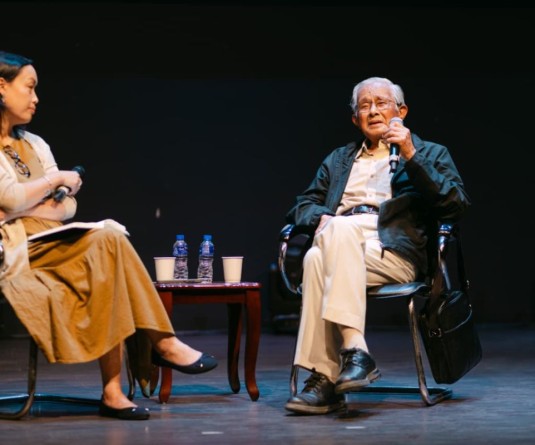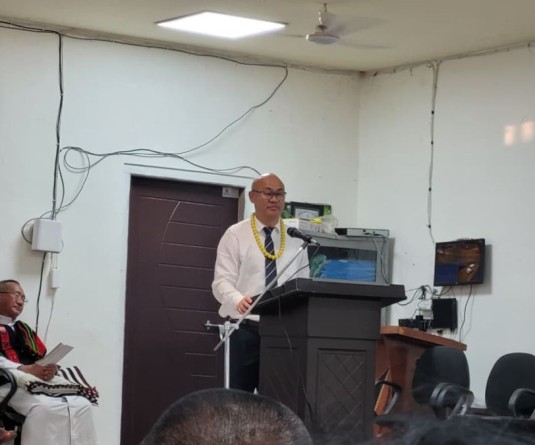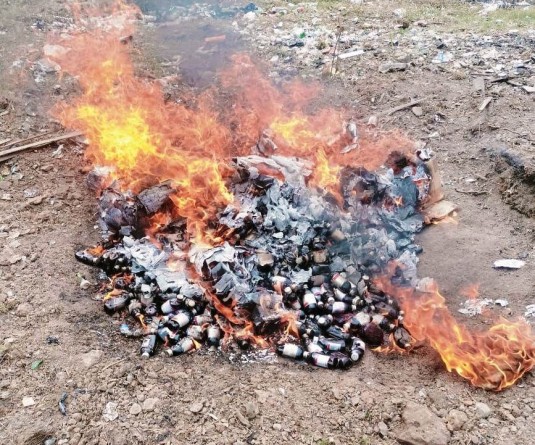
School students’ and women are seen participating at the seminar ‘Women & Children Ensuring their social security’ at Imagine Nagaland Hall, ATI, Kohima on April 8. (DIPR Photo)
Kohima, April 8 (MExN): The NCS and AEO probationers (2009) supported by Department of Women Development, today organized a seminar for college and higher secondary students under the topic’ Women and children- Ensuring their Social Security’ at ATI.
The resource persons included S.M. Ozukum, Advocate, who spoke on the topic ‘Protection of Women from Domestic Violence Act, 2005’. Stating that 2/3rd of married Indian women are victims of domestic violence, he said that the act recognizes domestic violence as a punishable offence. This act not only includes married women but also people in live-in relationships. The act was also adopted by the state in 2008, testifying to the fact that domestic violence is happening amongst Naga homes too. Ozukum, further added that women are the main beneficiaries of the act as it empowers them to file cases against the abuser.
Dr. Bernice Dzuvichu, Joint Director, TI, NSACS, another resource person spoke on the topic ‘HIV&AIDS and you-Risks and Consequences’. She described the routes of transmission and stated that the sexual route is highest in Nagaland. Saying that 39% of infection in India occurs among women, she stressed on the need for education, awareness and prevention. According to a study taken last year, 14.2% of young people between the age groups 15-29yrs are infected with HIV/AIDS. Informing that the earliest cases of HIV/AIDS was detected among injecting drug users, she said that the percentage has now come down to 5.6% while transmission through the sexual route has risen to 88% (February 2011 data). Dr. Dzuvichu also spoke about the need for psycho social support and added that NGOs like Network of Positive People, PLHA etc cater to these needs.
Resource person, Rupa, IPS, AIGP (Admn), spoke about immoral trafficking in women and children. She educated the gathering about the trafficking scenario in Nagaland and also about women rights. Lamenting that most cases of trafficking in Nagaland go unreported, she stressed about the need for victims to reach out for help in order to receive proper guidance and rehabilitation.
The last resource person to speak was K.Ela, Director, Prodigals Home, Dimapur. In her speech she said that most of us tend to be judgmental towards sex workers instead of helping them to come out of the profession. Giving statistics K. Ela informed that according to a nine month assessment taken in Dimapur girls between the ages of 21-25years accounted for the highest percentage of sex workers. 46% of the respondents were Nagas while the rest consisted of Adivasis, Nepalis, Burmese, Bangladeshis etc. What was surprising was that 43% of these sex workers are Christians, while 41% are Muslims and 16% are Hindus. 47% are unmarried, 32% are married, 6% are divorced, 8% are married but separated, 6% are widows and less than 1% are unwed mothers. With these staggering percentages, K. Ela stated that ‘sex work is deadly work’ and said that instead of judging society should think about how it can help sex workers to leave their professions and live respectable lives again. The seminar also made time for lively interactions where students and teachers clarified doubts and asked questions about the topics discussed. Earlier the welcome address was given by Shashank Shekhar (IAS), Director, ATI while a short speech was given by Chubathung Odyuo, Joint Director, DWD.
The resource persons included S.M. Ozukum, Advocate, who spoke on the topic ‘Protection of Women from Domestic Violence Act, 2005’. Stating that 2/3rd of married Indian women are victims of domestic violence, he said that the act recognizes domestic violence as a punishable offence. This act not only includes married women but also people in live-in relationships. The act was also adopted by the state in 2008, testifying to the fact that domestic violence is happening amongst Naga homes too. Ozukum, further added that women are the main beneficiaries of the act as it empowers them to file cases against the abuser.
Dr. Bernice Dzuvichu, Joint Director, TI, NSACS, another resource person spoke on the topic ‘HIV&AIDS and you-Risks and Consequences’. She described the routes of transmission and stated that the sexual route is highest in Nagaland. Saying that 39% of infection in India occurs among women, she stressed on the need for education, awareness and prevention. According to a study taken last year, 14.2% of young people between the age groups 15-29yrs are infected with HIV/AIDS. Informing that the earliest cases of HIV/AIDS was detected among injecting drug users, she said that the percentage has now come down to 5.6% while transmission through the sexual route has risen to 88% (February 2011 data). Dr. Dzuvichu also spoke about the need for psycho social support and added that NGOs like Network of Positive People, PLHA etc cater to these needs.
Resource person, Rupa, IPS, AIGP (Admn), spoke about immoral trafficking in women and children. She educated the gathering about the trafficking scenario in Nagaland and also about women rights. Lamenting that most cases of trafficking in Nagaland go unreported, she stressed about the need for victims to reach out for help in order to receive proper guidance and rehabilitation.
The last resource person to speak was K.Ela, Director, Prodigals Home, Dimapur. In her speech she said that most of us tend to be judgmental towards sex workers instead of helping them to come out of the profession. Giving statistics K. Ela informed that according to a nine month assessment taken in Dimapur girls between the ages of 21-25years accounted for the highest percentage of sex workers. 46% of the respondents were Nagas while the rest consisted of Adivasis, Nepalis, Burmese, Bangladeshis etc. What was surprising was that 43% of these sex workers are Christians, while 41% are Muslims and 16% are Hindus. 47% are unmarried, 32% are married, 6% are divorced, 8% are married but separated, 6% are widows and less than 1% are unwed mothers. With these staggering percentages, K. Ela stated that ‘sex work is deadly work’ and said that instead of judging society should think about how it can help sex workers to leave their professions and live respectable lives again. The seminar also made time for lively interactions where students and teachers clarified doubts and asked questions about the topics discussed. Earlier the welcome address was given by Shashank Shekhar (IAS), Director, ATI while a short speech was given by Chubathung Odyuo, Joint Director, DWD.






